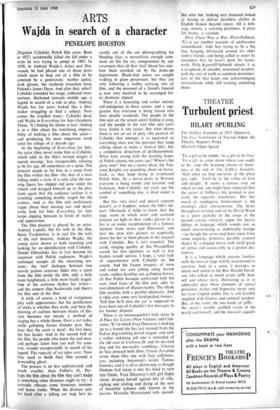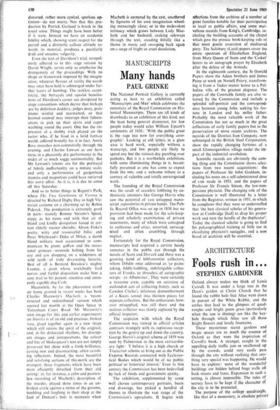THEATRE
Turbulent priest
HILARY SPURLING
The Stillkey Scandals of 1932 (Queen's) The Two Gentlemen of Verona (Open Air Theatre, Regent's Park) Macbeth (Open Space)
`Tis a gift to be simple, 'tis a gift to be free/ 'Tis a gift to come down where you ought to be', sings the beaming chorus of mour- ners at the end of The Stifikey Scandals, `And when we find ourselves in the place just right/ 'Twill be in the valley of love and delight'. It seems a curious note on which to end; one might have supposed that the rector of Stiffkey's life pointed to pre- cisely the opposite conclusion. But this mood of amphigoric bemusement is the evening's chief characteristic. The lyrics throughout (written and set by David Wood to a glum pastiche of the songs of the period) convey similarly vague but hearty tidings in language which sounds. not so much unconvincing as indefinably foreign —■-as though the verses had been taken from some ungainly, primitive, possibly oriental dialect by a.dogged native with small grasp of syntax and access only to a pocket dic- tionary.
It is a language which anyone familiar with the musical stage will be accustomed to construe. And, in a sense, it provides an idiom well suited to the Rev Harold David- son who talked so much arrant piffle him- self and whose story. illustrating as it so admirably does those elements of sexual prurience, malice and hypocrisy never very far from English public life, is still lavishly supplied with bizarre and comical incident. But, in the event, the two kinds of piffle— the rector's weirdly garbled vision of the world and himself, and the musical's equally
distorted, rather more cynical, spurious op- timism—do not marry. Not that this pro-
duction by Patrick Garland is brash in the usual sense. Things might have been better. if it were. Instead we have an academic fidelity which, showing scant respect for the period and a distinctly callous attitude to- wards its material, produces a peculiarly drab and anaemic vulgarity.
Even the text of Davidson's trial, scrupul- ously adhered to in this stage version by David Wright, serves only to emphasise the disingenuity of the proceedings. With no shape or framework imposed by the imagin- ation, whatever flavour of reality the words may once have held is submerged under fur- ther layers of humbug. The reckless eccen- tricity, the betrayals and squalid humilia- tions of Davidson's career are dissipated by stage conventions which decree that bishops are by definition doddery, judges dozy, pros- titutes wistful and tearstained, or that learned counsel may interrupt their fulmin- ations to pick up their skirts and caper warbling round the court. One has the im- pression of a shabby trick played on the rector who, if he lived in a lurid fantasy world, suffered brutally for it in fact. Annie Ross mooches non-committally through the evening, and Charles Lewsen as our hero turns in a pleasantly dry performance in the midst of so much soggy sentimentality. But Mr Lewsen's talents are for the portrayal of febrile ineffectuality on a minute scale; and only a performance of gargantuan stamina and magnetism could have retrieved this sorry affair. As it is, it is due to come off this Saturday.
And so to better things in Regent's Park, where The Two Gentlemen of Verona is directed by Richard Digby Day in high Vic- torian costume on a charming set by Robin Pidcock. The production is extremely good in parts--namely Ronnie Stevens's Speed, nippy as his name and with that air of bland and kindly dissipation found in cer- tain elderly rococo cherubs; Alison Fiske's pretty, witty and resourceful Julia; and Peter Whitbread's Duke of Milan, a dumb blond military man accustomed to com- municate by grunt, guffaw and the occas- ional grimace—monocle bolting from his eye and jaw dropping on a wilderness of wild teeth—of truly devastating ferocity. Best of all is Bernard Bresslaw's mighty Launce, a giant whose wretchedly frail nerves and fretful disposition make him a sore trial to his patient, attentive and emin- ently capable dog Crab.
Meanwhile, by far the pleasantest event on home ground in recent weeks has been Charles Marowitz's Macbeth, a 'recon- structed and redistributed' version which opened last month at the Open Space in Tottenham Court Road. Mr Marowitz's own image for this and earlier experiments on Hamlet is of an old and precious, broken vase, glued together again in a new shape which still retains the spirit of the original; and, in his dislocated rhythms, his discrep- ant images and juxtapositions, the colour and line of Shakespeare's text are not simply preserved but shine with a fresh brilliance, casting new and disconcerting. often ravish- ing reflections. Indeed, the most beautiful and satisfying sections of this work are the strangest, those fragments which have been most efficiently detached from their old setting: in. for instance, a calm and passion- less recording of Macbeth's description of the murder, played three times in an un- broken circle against a mime of the groonrts, tumbling and laughing in their sleep at the foot of Duncan's bed; in moments when Macbeth is cornered by the cast, smothered by figments of his own imagination wheel- ing menacingly close; or in the malevolent intimacy which grows between Lady Mac- beth and her husband, snaking sideways through the text, receding fitfully like a theme in music and swooping back again on a surge of fright or cruel desolation.







































 Previous page
Previous page